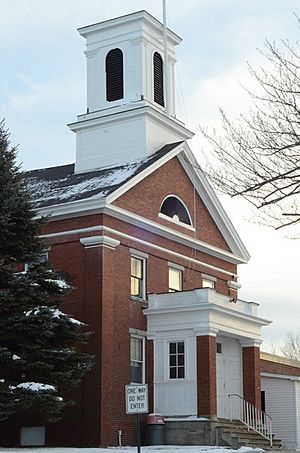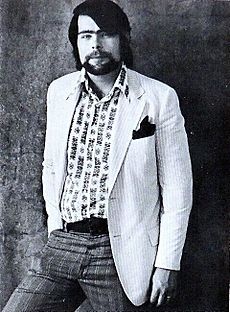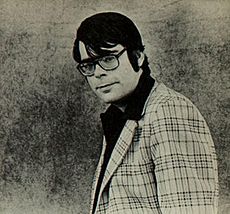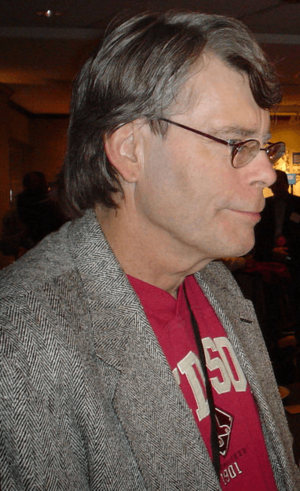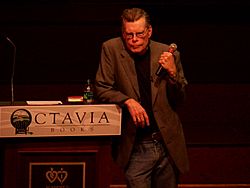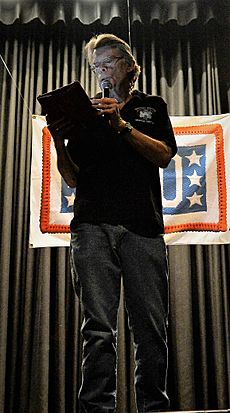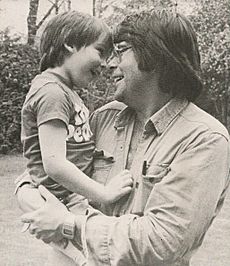Stephen King facts for kids
Quick facts for kids
Stephen King
|
|
|---|---|
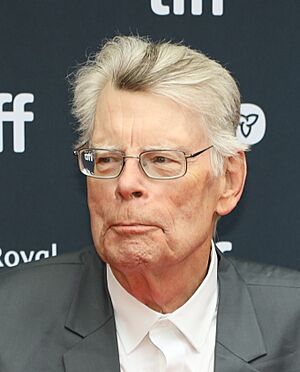
King in 2024
|
|
| Born | Stephen Edwin King September 21, 1947 Portland, Maine, U.S. |
| Pen name |
|
| Occupation | Author |
| Education | University of Maine (BA) |
| Period | 1967–present |
| Genre |
|
| Spouse |
Tabitha Spruce
(m. 1971) |
| Children | 3, including Joe and Owen |
| Signature | |
 |
|
Stephen Edwin King (born September 21, 1947) is an American author. He is often called the "King of Horror" because he is famous for his scary novels. He also writes in other styles, like suspense, crime, science fiction, fantasy, and mystery. Even though he is best known for his novels, he has written about 200 short stories. Many of these stories have been published in collections.
His first novel, Carrie (1974), made him a well-known horror writer. Later, Different Seasons (1982), a collection of four shorter novels, showed he could write other types of stories too. Many of King's books have been made into movies. Some popular ones include Carrie (1976), The Shining (1980), Stand by Me (1986), Misery (1990), The Shawshank Redemption (1994), The Green Mile (1999), and It (2017).
Stephen King has also written books under the name Richard Bachman. He has worked with other writers, including his friends and his sons, Joe Hill and Owen King. He has also written non-fiction books, like Danse Macabre (1981) and On Writing (2000).
King has won many awards for his writing. These include the O. Henry Award for his short story "The Man in the Black Suit" (1994). He also received special honors for his contributions to literature. These include the 2003 Medal for Distinguished Contribution to American Letters and the 2014 National Medal of Arts.
Contents
- Early Life and Education
- Career Highlights
- Starting Out as a Writer
- From Carrie to The Dead Zone (1970s)
- From Different Seasons to The Dark Half (1980s)
- From Four Past Midnight to Hearts in Atlantis (1990s)
- From On Writing to Under the Dome (2000s)
- From Full Dark, No Stars to The Institute (2010s)
- From If It Bleeds to Present (2020s)
- Using Other Names (Pseudonyms)
- The Dark Tower Series
- Working with Others
- Writing Style and Themes
- Views and Community Involvement
- Giving Back (Philanthropy)
- Personal Life
- Awards and Honors
- Filmography
- See also
Early Life and Education
Stephen King was born in Portland, Maine, on September 21, 1947. His father left the family when Stephen was two years old. His mother, Nellie Ruth King, raised him and his older brother David by herself. They often faced financial difficulties and moved many times. When Stephen was 11, his family settled in Durham, Maine.
King says he started writing when he was very young, around six or seven. He would copy pictures from comic books and then make up his own stories. Movies were also a big inspiration for him. He loved being scared and enjoyed horror stories from an early age. His mother encouraged him to write his own stories, which made him feel like he had "the key to open any [door] I liked."
He was a very eager reader as a child. He read all kinds of books, from Nancy Drew mysteries to more thrilling stories. He especially loved The Shrinking Man by Richard Matheson. His aunt even paid him a quarter for each story he wrote. One of his earliest surviving stories is "Jhonathan and the Witchs", which he wrote when he was nine.
A bookmobile driver once gave him Lord of the Flies. King found this book very powerful. He said it was the first book that truly grabbed his attention and showed him that stories could be about "life or death." He attended Durham Elementary School and then Lisbon High School in Lisbon Falls, Maine. He wrote for his brother's newspaper and sold stories to his friends. His first story published outside of school was "I Was a Teenage Grave Robber" in a fan magazine in 1965.
In 1966, King went to the University of Maine at Orono on a scholarship. He wrote for the student newspaper and met professors who helped him with his writing. He also met Tabitha Spruce in a writing workshop, and they fell in love. King graduated in 1970 with a degree in English. He and Tabitha got married in 1971.
Career Highlights
Starting Out as a Writer
Stephen King sold his first professional short story, "The Glass Floor", in 1967. After college, he couldn't find a teaching job right away. He continued to sell short stories to magazines. Many of these early stories were later collected in his book Night Shift (1978). In 1971, King became an English teacher at Hampden Academy in Hampden, Maine. He kept writing short stories and working on ideas for novels.
From Carrie to The Dead Zone (1970s)
King's first novel, Carrie, came from two ideas: how cruel teenagers can be and the power of moving things with your mind (telekinesis). He almost threw away the first few pages, but his wife, Tabitha, found them and encouraged him to finish the story. Carrie is about a high school student named Carrie White who has special powers. It explores her difficult relationship with her very religious mother.
While teaching Dracula to his students, King wondered what would happen if vampires came to a small New England town. This idea led to his novel 'Salem's Lot. After this, King and his family moved to Boulder, Colorado. He visited the Stanley Hotel in Estes Park, which inspired The Shining. This book is about a writer and his family who take care of a hotel during the winter, and strange things happen.
In 1975, King's family moved back to Auburn, Maine. There, he finished The Stand, a long story about a worldwide sickness and what happens afterward. King said it was the longest book for him to write, but also one that his readers still love the most. In 1979, he published The Dead Zone, about a man who can see future events. This was the first of his novels to be set in the fictional town of Castle Rock, Maine.
From Different Seasons to The Dark Half (1980s)
In 1982, King released Different Seasons, a collection of four shorter novels. These stories were more serious and dramatic than his usual horror. Critics praised this collection, and three of the four stories were made into popular movies: The Body became Stand by Me (1986), Rita Hayworth and Shawshank Redemption became The Shawshank Redemption (1994), and Apt Pupil became a film of the same name (1998).
In 1983, he published Christine, a story about a teenager, his girlfriend, and a haunted car. Later that year, he published Pet Sematary. He wrote this book after his daughter's cat was killed and buried in a pet cemetery. He imagined a place beyond it that could bring the dead back to life, but not perfectly.
In 1985, King published Skeleton Crew, a collection of short stories. He also wrote It, a story about a shape-shifting monster that takes the form of people's fears and haunts the town of Derry, Maine. King said he wanted to include all the monsters people were afraid of as kids in this one big story.
In 1987, King had a very busy year. He published The Eyes of the Dragon, a fantasy novel he wrote for his daughter. He also published Misery, about a famous writer who is held captive by his "number-one fan." Misery won an award called the Bram Stoker Award. Two years later, he published The Dark Half, about an author whose made-up character seems to come to life.
From Four Past Midnight to Hearts in Atlantis (1990s)
In 1990, King published Four Past Midnight, another collection of four novellas. In 1991, he released Needful Things, which he called "The Last Castle Rock Story." In 1992, he published Gerald's Game and Dolores Claiborne, two novels about women that are loosely connected. Dolores Claiborne is told by the main character in one long speech.
In 1994, King's story "The Man in the Black Suit" was published in The New Yorker magazine and later won the O. Henry Award. In 1996, he published The Green Mile as a series of six smaller books. This story is about a death row inmate. It was very popular, with all six parts appearing on The New York Times best-seller list at the same time.
In 1998, he published Bag of Bones, about a novelist who recently lost his wife. Many reviewers said this book showed how much King had grown as a writer. Bag of Bones won the Bram Stoker and August Derleth Awards. In 1999, he published The Girl Who Loved Tom Gordon, about a girl lost in the woods, and Hearts in Atlantis, a book of connected stories about growing up in the 1960s.
Later in 1999, King was hit by a van while walking. He was seriously injured but recovered. He later joked that his nurses were told "don't make any Misery jokes" because of the book's plot.
From On Writing to Under the Dome (2000s)
In 2000, King published On Writing, a book that combines his life story with advice on how to write. It was called "a one-of-a-kind classic." Later that year, he released Riding the Bullet, which was one of the first popular e-books. He also tried publishing a horror novel called The Plant online in parts, asking readers to pay what they thought it was worth. The unfinished novel is now available for free on his official website.
In 2002, King published From a Buick 8, a story similar to Christine. In 2005, he released the mystery The Colorado Kid. In 2006, he published Cell, where a strange signal sent through cell phones turns people into violent killers. That same year, he published Lisey's Story, about a novelist's widow. King calls it his favorite novel because it explores the secret world that a long marriage creates.
In 2008, King published Duma Key, his first novel set in Florida, and the collection Just After Sunset. In 2009, his novel Under the Dome was published and quickly became a bestseller. It tells the story of a town suddenly trapped under a mysterious, invisible dome.
From Full Dark, No Stars to The Institute (2010s)
In 2010, King published Full Dark, No Stars, a collection of four novellas about revenge. In 2011, he released 11/22/63, a story about a time traveler who tries to prevent the Kennedy assassination. This book was praised as one of the best time travel stories. In 2013, he published Joyland, a mystery set at an amusement park. Later that year, he published Doctor Sleep, which is a sequel to The Shining.
In 2014, King published Mr. Mercedes, a crime novel about a retired policeman and a killer. This book won the Edgar Allan Poe Award for Best Novel. He then returned to horror with Revival. Mr. Mercedes was the first book in a trilogy, followed by Finders Keepers (2015) and End of Watch (2016). In 2018, he released The Outsider and the novella Elevation. In 2019, he published The Institute.
From If It Bleeds to Present (2020s)
In 2020, King released If It Bleeds, a collection of four novellas. In 2021, he published Later. In 2022, King released the novel Fairy Tale. Holly, a novel featuring the character Holly Gibney, was released in September 2023. In May 2024, the short story collection You Like It Darker was published. It quickly became a bestseller. His newest novel, Never Flinch, also featuring Holly Gibney, was released in May 2025.
Using Other Names (Pseudonyms)
Stephen King published five novels under the name Richard Bachman: Rage (1977), The Long Walk (1979), Roadwork (1981), The Running Man (1982), and Thinner (1984). He used a different name because publishers at the time thought readers would only buy one book a year from the same author. The Bachman books are often darker than King's usual stories.
In 1985, a bookstore clerk named Steve Brown discovered that Richard Bachman was actually Stephen King. King then announced that "Richard Bachman" had died. King later explained that he created Bachman as a way to publish more books without confusing readers.
When Desperation (1996) was released, a related novel called The Regulators was published as a "discovered manuscript" by Bachman. In 2006, King announced he had found another Bachman novel, Blaze, which was published in 2007.
King has used other names too. In 1972, the short story "The Fifth Quarter" was published under the name John Swithen. In 2016, a children's book called Charlie the Choo-Choo: From the World of The Dark Tower was published under the name Beryl Evans. This book is based on a fictional book from King's The Dark Tower III: The Waste Lands.
The Dark Tower Series
In the late 1970s, King started a long series of books called The Dark Tower. It's about a lone hero named Roland, a gunslinger, who chases a mysterious "Man in Black" across a different world. This world is a mix of fantasy and the American Wild West. The first story, The Dark Tower: The Gunslinger, was published in parts from 1977 to 1981. The series grew into eight books, published between 1978 and 2012.
Working with Others
Writing Collaborations
Stephen King has written two novels with his friend Peter Straub: The Talisman (1984) and Black House (2001). They tried to write in a way that made it hard to tell who wrote which parts.
King also worked with photographer f-stop Fitzgerald on a book called Nightmares in the Sky: Gargoyles and Grotesques (1988). He created a special book with designer Barbara Kruger, My Pretty Pony (1989).
King co-wrote Throttle (2009) with his son Joe Hill. Their second collaboration, In the Tall Grass (2012), was published in a magazine. King and his son Owen co-wrote Sleeping Beauties (2018), which is set in a women's prison. King and Richard Chizmar co-wrote Gwendy's Button Box (2017). They worked together again on Gwendy's Final Task in 2022.
Film and Television Work
King wrote his first movie script for George A. Romero's Creepshow (1982), which was a tribute to old horror comics. In 1985, he wrote another horror movie called Cat's Eye. The director Rob Reiner, who made the movie Stand by Me from King's story, named his film company Castle Rock Entertainment after King's fictional town. This company produced other movies based on King's books, like Misery (1990) and The Shawshank Redemption (1994).
In 1986, King directed his first movie, Maximum Overdrive, based on his story "Trucks". He also wrote several TV miniseries in the 1990s, including Golden Years (1991), The Stand (1994), The Shining (1997), and Storm of the Century (1999). He also created the miniseries Rose Red (2002) and the TV show Kingdom Hospital (2004).
Music and Other Projects
King worked with Stan Winston and Mick Garris on the music video Michael Jackson's Ghosts (1996). He co-wrote the musical Ghost Brothers of Darkland County (2012) with T. Bone Burnett and John Mellencamp.
In 1985, King wrote for an X-Men comic book. In 2010, DC Comics started American Vampire, a comic book series co-written by King and Scott Snyder. King wrote the background story for the first American vampire in the first five issues.
Writing Style and Themes
How Stephen King Writes
In his book On Writing, Stephen King says that stories are "found things, like fossils in the ground." He believes a writer's job is to dig them out as carefully as possible. He often starts with a "what-if" question. For example, what if a writer and his family were stuck in a haunted hotel (The Shining)? Or what if someone could see the future (The Dead Zone)?
King says that the situation comes first, then the characters. He lets his characters act in their own ways, and often the story ends in a way he didn't expect. Joyce Carol Oates, another famous writer, said King is good at telling stories and creating amazing pictures with his words. He uses comparisons to help readers see old things in new ways.
Common Themes in His Work
When asked if fear was his main topic, King explained that he is interested in how ordinary people deal with extraordinary things. This could be a scary monster or a difficult life challenge. He explores how these situations show us who we are and how we interact with others.
Joyce Carol Oates noted that King often writes about small-town American life, especially in his fictional town of Derry, Maine. He tells stories about families, marriages, and groups of children facing challenges when adults can't help. He uses scary or supernatural elements to highlight the struggles of real life. King often writes about growing up, a theme he explores in books like The Body and Joyland.
King often includes authors as characters in his books, such as Ben Mears in 'Salem's Lot and Jack Torrance in The Shining. He even appears as himself in some of his The Dark Tower novels. This allows him to explore ideas about writing and what it means to be an author.
Walter Mosley, another author, said that King celebrates everyday people and makes their lives seem heroic. He helps us see that even if we struggle, we can still make a difference. King himself said that even though fiction is made up, he always tries to tell the truth about how real people would act in similar situations.
Writers Who Influenced Him
In On Writing, King advises aspiring writers to "read a lot and write a lot." He learned about good descriptions from writers like Raymond Chandler and Dashiell Hammett. He also gained respect for clear, short language from poets like T. S. Eliot.
King has called Richard Matheson "the author who influenced me most." Other writers who inspired him include Ray Bradbury and Shirley Jackson. He often pays tribute to classic horror stories by retelling them in a modern way. For example, 'Salem's Lot is similar to Bram Stoker's Dracula, and Revival is a modern take on Mary Shelley's Frankenstein.
He also loved a collection of short stories called The Golden Argosy, which he bought for a small price. He said it taught him more about good writing than any class.
Views and Community Involvement
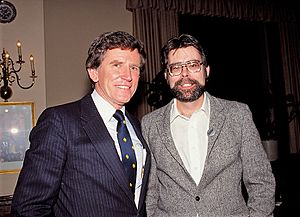
Stephen King grew up in the Methodist church but later questioned organized religion. However, he says he does believe in God. He has been involved in politics and social issues. In 1984, he supported Gary Hart for president. In 2008, he supported Barack Obama for president.
In 2013, King published an essay called Guns after the Sandy Hook Elementary School shooting. He asked gun owners to support a ban on certain types of weapons, saying they are "weapons of mass destruction."
In 2016, King was one of many writers who signed a letter against the presidential candidate Donald Trump. The letter stated that writers are aware of how language can be misused for power. It said that a candidate who encourages aggression and disrespects women and minorities needs a strong response.
King has also spoken out against former Iowa Rep. Steve King, saying he was tired of being confused with him. In June 2018, King called for the release of Ukrainian filmmaker Oleg Sentsov, who was in jail in Russia. In the 2020 presidential primaries, King supported Elizabeth Warren. After she ended her campaign, he supported Joe Biden for president. In 2022, during the Russian invasion of Ukraine, King showed his support for Ukraine and said he would not work with Russian publishers.
In July 2022, Stephen King was tricked by Russian pranksters who pretended to be Volodymyr Zelenskyy. King later apologized on Twitter, explaining that he was not the only person who fell for the prank.
In August 2022, King testified in a court case about a large merger between two book publishers. His testimony, which was against his own publisher, helped convince the judge to block the merger. In 2024, King suggested that Joe Biden should not run for re-election and later supported Kamala Harris.
Maine Politics
King has often spoken about politics in his home state of Maine. He criticized former Maine Governor Paul LePage. King said LePage was "a terrible embarrassment to the state I live in and love." He also called LePage "a bigot, a homophobe, and a racist."
Giving Back (Philanthropy)
Stephen King and his wife, Tabitha, are very generous. They support the National Poetry Foundation and have created scholarships for students. King donates about $4 million each year to various causes. These include libraries, fire departments that need new equipment, schools, and arts organizations. Their foundation, the Stephen and Tabitha King Foundation, is one of the top charities in Maine, giving millions of dollars in grants each year.
In 2002, King and other authors held a public reading to raise money for an actor and audiobook reader named Frank Muller, who had been in a motorcycle accident. In 2011, their foundation donated $70,000 to help families in their hometown of Bangor, Maine, pay their heating bills during the winter. In 2021, King's Foundation donated $6,500 to help children from a school in Lewiston, Maine, publish two novels they had been working on.
Personal Life
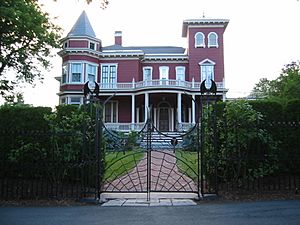
Stephen King married Tabitha Spruce on January 2, 1971. She is also a novelist and helps with their charity work. She has always supported him, even saving his early manuscript for Carrie from the trash. They have three homes: one in Bangor, Maine, one in Lovell, Maine, and a winter home in Sarasota, Florida. King's home in Bangor is a popular spot for tourists. As of 2019, the Kings planned to turn it into a place for his archives and a writing retreat.
The Kings have three children: Naomi (born 1970), Owen (born 1977), and Joseph (born 1972). Both of his sons, Owen King and Joseph Hillström King (who writes as Joe Hill), are also successful authors.
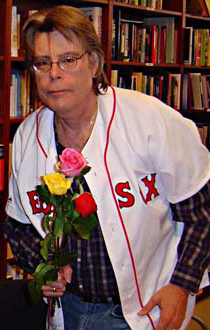
King is a big fan of baseball, especially the Boston Red Sox. He wrote an essay about his son Owen's Little League team in The New Yorker in 1990. He also co-wrote a book called Faithful about the Red Sox's historic 2004 season when they won the 2004 World Series. Baseball also appears in his stories The Girl Who Loved Tom Gordon and Blockade Billy.
Music, especially rock, is important in many of King's books. He has mentioned Bob Dylan and AC/DC as some of his favorite artists. He also played guitar in a charity band called the Rock Bottom Remainders with other famous authors like Amy Tan and Dave Barry. They released an album and wrote books about their experiences.
King and his wife own a group of radio stations called Zone Corporation. In December 2024, King announced that most of the stations would close at the end of the year due to his age and financial losses. However, he reached a deal to sell one station, WKIT.
King is still a very active reader. He has shared lists of his favorite books, which include classics like Adventures of Huckleberry Finn, Lord of the Flies, and Nineteen Eighty-Four. He enjoys reading many different types of books, from thrillers to poetry. He especially loves the narrative poems of Stephen Dobyns.
Car Accident and Recovery
On June 19, 1999, Stephen King was walking on the side of a road in Lovell, Maine, when he was hit by a minivan. The driver was distracted by a dog. King was seriously injured, with a collapsed lung, multiple broken bones in his right leg, and a broken hip. Doctors considered amputating his leg, but they were able to save it. He had several operations and physical therapy.
King's wife bought the van that hit him to prevent it from being sold as a souvenir. King later said that his wife's idea to quietly remove the van was better than his own thoughts of smashing it. He slowly recovered and continued his writing.
Other Appearances
In the book The Princess Bride, the author William Goldman jokingly writes that Stephen King is "doing the abridgment" of a fictional book. King explained this was an inside joke between him and Goldman, who is a friend and has adapted several of King's novels into movies.
In 1988, King provided a spoken introduction for an updated version of the song "Astronomy" by the band Blue Öyster Cult. In 2012, he narrated Shooter Jennings's album Black Ribbons. King has also appeared on TV shows like Celebrity jeopardy! and made cameos in movies and TV shows based on his books. He even voiced himself in an episode of The Simpsons called "Insane Clown Poppy". He also played a character named Bachman on Sons of Anarchy, a nod to his pseudonym.
Awards and Honors
- August Derleth Award, given by the British Fantasy Society
- 1981: Special Award
- 1982: Cujo'
- 1987: It
- 1999: Bag of Bones
- 2005: The Dark Tower VII: The Dark Tower
- British Fantasy Award For Best Short Fiction
- 1983: "The Breathing Method"
- Balrog Award Best Collection / Anthology 1980: Night Shift
- Black Quill Award Best Dark Genre Novel 2009: Duma Key
- Bram Stoker Award, given by the Horror Writers Association
- Best Novel
- 1987: Misery.
- 1996: The Green Mile
- 1998: Bag of Bones
- 2006: Lisey's Story
- 2008: Duma Key
- 2013: Doctor Sleep
- Best Fiction Collection
- 1990: Four Past Midnight
- 2009: Just After Sunset
- 2011: Full Dark, No Stars
- Best Short Fiction
- 1995: "Lunch at the Gotham Café"
- 2000: "Riding the Bullet"
- 2011:"Herman Wouk is Still Alive"
- Best Non-Fiction
- 2000: On Writing: A Memoir of the Craft
- 2002: Lifetime Achievement Award
- Best Novel
- Edgar Award for Best Novel, given by the Mystery Writers of America
- 2015: Mr. Mercedes
- Mystery Writers of America 2007 Grand Master Award
- 1982 Hugo Award for Best Related Work: Danse Macabre
- International Horror Guild Awards
- 1999: Storm of the Century
- 2003: Living Legend
- Locus Awards
- 1982: Danse Macabre
- 1986: Skeleton Crew
- 1997: Desperation
- 1999: Bag of Bones
- 2001: On Writing
- 2003 Medal for Distinguished Contribution to American Letters
- 2014 National Medal of Arts
- National Magazine Awards
- 2004: "Rest Stop"
- 2013: "Batman and Robin Have an Altercation"
- 1996 O. Henry Award "The Man in the Black Suit"
- 2005 Quill Award for Faithful (with Stewart O'Nan)
- 2009 Shirley Jackson Award for "Morality"
- Spokane Public Library Golden Pen Award 1986: Golden Pen Award
- University of Maine 1980: Alumni Career Award
- World Fantasy Award
- 1980: Convention Award
- 1982: "Do the Dead Sing?"
- 1995: "The Man in the Black Suit"
- 2004: Lifetime Achievement
- 1992 World Horror Convention : World Horror Grandmaster
- 1997 Writers For Writers Award, given by Poets & Writers Magazine
Carrie was listed by the New York Public Library as one of the "Books of the Century" in the "Pop Culture Mass & Entertainment" category. In 2008, On Writing was ranked 21st on Entertainment Weekly's list of "The New Classics: The 100 Best Reads from 1983 to 2008." It also made Time magazine's list of the 100 greatest non-fiction books published since 1923.
11/22/63 (2011) was named one of the five best fiction books of the year by The New York Times. The newspaper praised how King blended ordinary life with the supernatural and explored ideas of memory and fate.
Filmography
| Year | Title | Director | Executive producer | Writer | Actor | Notes |
|---|---|---|---|---|---|---|
| 1981 | Knightriders | No | No | No | Yes | Role: Hoagie Man |
| 1982 | Creepshow | No | No | Yes | Yes | Role: Jordy Verrill |
| 1983 | The Dead Zone | No | No | Yes | No | |
| 1985 | Cat's Eye | No | No | Yes | No | |
| 1985 | Silver Bullet | No | No | Yes | No | |
| 1986 | Maximum Overdrive | Yes | No | Yes | Yes | Role: Man at Bank ATM |
| 1987 | Creepshow 2 | No | No | No | Yes | Role: Truck Driver |
| 1987 | Tales from the Darkside | No | No | Yes | No | 1 episode: "Sorry, Right Number" |
| 1989 | Pet Sematary | No | No | Yes | Yes | Role: Minister |
| 1991 | Golden Years | No | Yes | Yes | Yes | Miniseries, also created by King, role: Bus Driver |
| 1992 | Sleepwalkers | No | No | Yes | Yes | Role: Cemetery Caretaker |
| 1994 | The Stand | No | Yes | Yes | Yes | Miniseries, role: Teddy Weizak |
| 1995 | The Langoliers | No | No | No | Yes | Miniseries, role: Tom Holby |
| 1996 | Thinner | No | No | No | Yes | Role: Pharmacist |
| 1997 | The Shining | No | Yes | Yes | Yes | Miniseries, role: Gage Creed |
| 1998 | The X-Files | No | No | Yes | No | 1 episode: "Chinga" |
| 1999 | Storm of the Century | No | Yes | Yes | Yes | Miniseries, role: Lawyer in Ad / Reporter on Broken TV |
| 1999 | Frasier | No | No | No | Yes | 1 episode: "Mary Christmas", role: Brian |
| 2000 | The Simpsons | No | No | No | Yes | 1 episode: "Insane Clown Poppy", role: Himself |
| 2002 | Rose Red | No | Yes | Yes | Yes | Miniseries, role: Pizza Delivery Guy |
| 2003 | The Diary of Ellen Rimbauer | No | Yes | No | No | TV film |
| 2004 | Kingdom Hospital | No | Yes | Yes | Yes | 9 episodes, also developed by King, role: Johnny B. Goode |
| 2004 | Riding the Bullet | No | Yes | No | No | |
| 2005 | Fever Pitch | No | No | No | Yes | Role: Stephen King |
| 2005 | Gotham Cafe | No | No | No | Yes | Short film, role: Mr. Ring |
| 2006 | Desperation | No | Yes | Yes | No | TV film |
| 2007 | Diary of the Dead | No | No | No | Yes | Role: Newsreader (voice, uncredited) |
| 2010 | Sons of Anarchy | No | No | No | Yes | 1 episode: "Caregiver", role: Bachman |
| 2012 | Stuck in Love | No | No | No | Yes | Role: Stephen King (voice) |
| 2014 | Under the Dome | No | Yes | Yes | Yes | 1 episode: "Heads Will Roll", role: Diner Patron |
| 2014 | A Good Marriage | No | No | Yes | No | |
| 2016 | 11.22.63 | No | Yes | No | No | |
| 2016 | Cell | No | No | Yes | No | |
| 2017 | Mr. Mercedes | No | Yes | No | Yes | Role: Diner Patron |
| 2018 | Castle Rock | No | Yes | No | No | |
| 2019 | It Chapter Two | No | No | No | Yes | Role: Shopkeeper |
| 2021 | Lisey's Story | No | Yes | Yes | No | Miniseries |
See also
 In Spanish: Stephen King para niños
In Spanish: Stephen King para niños
- List of adaptations of works by Stephen King
- Castle Rock (Stephen King)
- Charles Scribner's Sons (aka Scribner)
- Derry (Stephen King)
- Dollar Baby
- Jerusalem's Lot (Stephen King)
- Haven
 | Misty Copeland |
 | Raven Wilkinson |
 | Debra Austin |
 | Aesha Ash |


